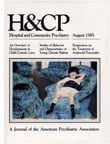Patients' Release of Medical Records: Involuntary, Uninformed Consent?
Abstract
The authors reviewed 200 requests for records of psychiatric patients submitted to a university-affiliated hospital in May and June 1983. They looked at the sources of and reasons for the requests and subsequent uses and handling of released information. A survey of 32 patients who released all or part of their records indicated that most felt strongly about limiting access to their records, yet 81 percent felt that release was mandatory to get medical, financial, or other help. Those and other survey findings led the authors to question whether patients' release of information was truly informed and to draw up guidelines that health care providers can use to protect patients' confidentiality.
Access content
To read the fulltext, please use one of the options below to sign in or purchase access.- Personal login
- Institutional Login
- Sign in via OpenAthens
- Register for access
-
Please login/register if you wish to pair your device and check access availability.
Not a subscriber?
PsychiatryOnline subscription options offer access to the DSM-5 library, books, journals, CME, and patient resources. This all-in-one virtual library provides psychiatrists and mental health professionals with key resources for diagnosis, treatment, research, and professional development.
Need more help? PsychiatryOnline Customer Service may be reached by emailing [email protected] or by calling 800-368-5777 (in the U.S.) or 703-907-7322 (outside the U.S.).



